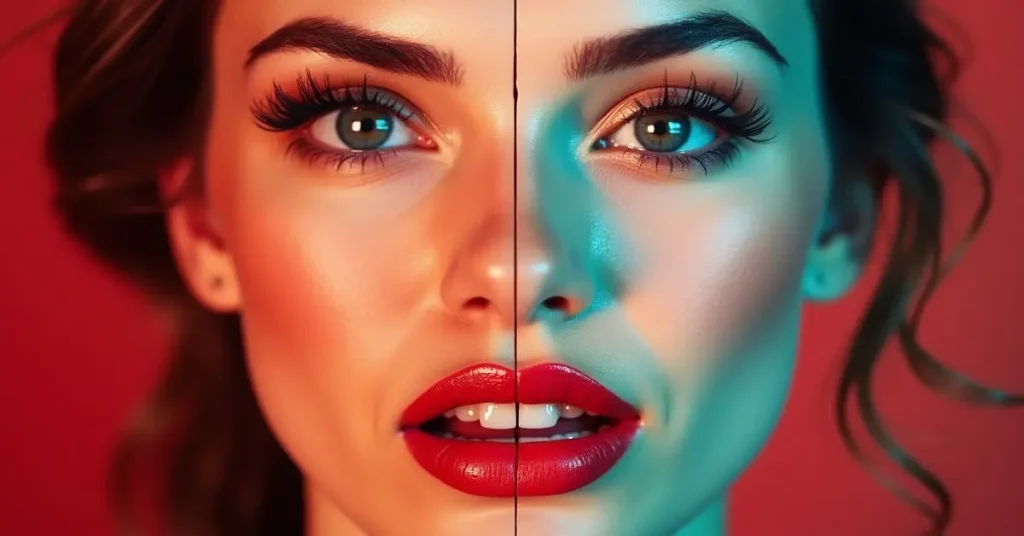A viral X post by user Ute Maria Laufs (@LaufsUte) has sparked a heated debate about modern beauty standards, leaving the internet buzzing with reactions.
While standing in line at a local discounter, Laufs observed a woman with 80cm-long hair extensions—adhesive strips glaringly visible just 10cm from the roots—paired with what she described as “Schlauchbootlippen” (a German slang term for overly plump lips resembling inflatable boats) and dramatic, Miss Piggy-esque eyelashes.
Shocking Beauty Trends Exposed
Her post, which has since garnered thousands of views, didn’t just stop at observation—it called out these beauty practices as potential “self-harming behavior,” igniting a firestorm of discussion about the lengths people go to for perfection.
Laufs’ post ties her real-life encounter to the German reality TV show Shopping Queen, a popular program where contestants compete to create themed outfits under time and budget constraints.
The show, which has been a staple since 2012, often showcases dramatic transformations and bold beauty choices, reflecting broader societal trends. But Laufs’ critique goes deeper, questioning whether the pursuit of beauty—through extreme lip fillers, heavy makeup, and artificial enhancements—has crossed into dangerous territory. “You stand 50cm away, and the madness is immediately exposed,” she wrote in a follow-up post, comparing the woman’s look to the exaggerated glamour of Miss Piggy, the iconic Muppet known for her over-the-top style.
The controversy comes at a time when beauty standards are under increasing scrutiny. A 2024 report from Medical News Today highlighted the mental health toll of societal pressures, linking unrealistic beauty ideals to low self-esteem, negative body image, and even eating disorders, particularly among young women.
The rise of cosmetic procedures like lip fillers—celebrated for their ability to enhance natural features—has also faced backlash. According to Leva Medical, while fillers can create a “natural-looking, slightly plump appearance,” overdoing it can lead to unnatural results, as Laufs described. The term “Schlauchbootlippen” has become a cultural shorthand in Germany for this phenomenon, often used to mock or critique excessive lip augmentation.
Experts are weighing in on the debate. Dr. Anna Müller, a Berlin-based psychologist specializing in body image, told us, “The pressure to conform to beauty standards amplified by media and reality TV can push individuals toward extreme modifications.
What starts as a desire to enhance can spiral into a cycle of self-criticism and even harm.” She points to the influence of shows like Shopping Queen, which, while empowering for some, can also perpetuate unattainable ideals by glorifying dramatic transformations.
On the other side, beauty influencers argue that such choices are a form of self-expression. “If someone wants to rock long lashes and full lips, that’s their right,” says Lena Schmidt, a Munich-based beauty vlogger with over 500K followers. “Calling it self-harm feels judgmental—it’s about confidence, not damage.” Schmidt, who has competed on Shopping Queen, credits the show with helping her embrace her bold style, though she admits the pressure to stand out can be intense.
The X post has also reignited conversations about the role of reality TV in shaping beauty norms. Shopping Queen, which challenges contestants to create unique looks (like the “Black Beauty” theme described on Caterina Catalano’s fashion blog), often showcases contestants with striking makeovers.
But as Laufs’ observation suggests, the line between transformation and excess can be blurry. Viewers are now questioning whether such shows are empowering women or fueling a toxic cycle of comparison.
As the debate rages on, one thing is clear: beauty standards are evolving, but at what cost? Are these trends a celebration of individuality, or a cry for help hidden behind a glamorous facade? Share your thoughts in the comments below—and stay tuned as we dive deeper into the world of beauty, reality TV, and the quest for perfection.
What do you think—has the pursuit of beauty gone too far? Click to join the conversation!
